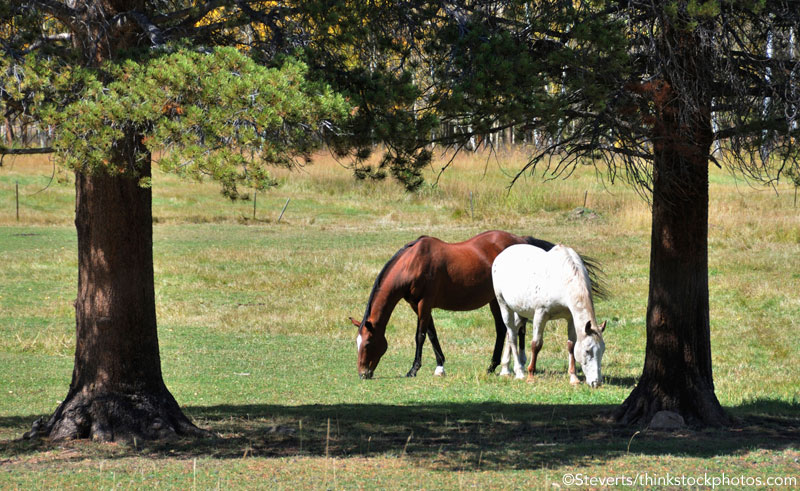
Plenty of turnout time and free-choice forage is the best defense against ulcers in horses, but there are also supplements that can help alleviate ulcer pain for affected horses.
Could supplementing a horse’s diet with aloe vera gel work as well as commercial products for reducing the effects of gastric ulcers? Researchers from the University of Adelaide in South Australia sought to find out in a recently published study.
Intro to Equine Ulcers
The only definitive method to diagnose ulcers is through an endoscopy, a relatively quick and simple procedure that can be performed at most equine vet clinics or hospitals.
According to an article from the UC Davis School of Veterinary Medicine, more than half of all horses are affected by gastric ulcers. Rigorous exercise is believed to contribute to the risk of ulcers because it increases gastric acid production while reducing blood flow to the GI tract. This is one of the reasons why horses competing in shows and endurance rides are at higher risk than other horses. Thoroughbred race horses are the most at risk, with an estimated 90% being affected.
Ulcer Treatment
Ulcers can be prevented or managed, to an extent, through changes in feeding and housing. Infrequent, large feedings increase the risk of ulcers because they cause the digestive system to produce a large amount of stomach acid and then leave the stomach empty for a period of time. Free access to good-quality forage (hay or grass) 24 hours a day eliminates this problem and is one of the best ways to reduce the risk of ulcers. Allowing the horse to move freely through ample turnout also helps, although it’s important to make sure the turnout arrangement is comfortable. If a horse is bullied by his turnout buddies, that will cause stress which can also increase ulcer risk.
There are several commercial products on the market that have been created to alleviate ulcers in horses. Most of these contain the active ingredient omeprazole. This is the same ingredient used in some ulcer medicines for humans, such as Prilosec. However, some horse owners feed an aloe vera supplement to treat ulcers, but little research is available to determine whether or not this is an effective option.
Aloe vs. Omeprazole
Researchers from the School of Animal and Veterinary Sciences at the University of Adelaide, South Australia, conducted a randomized, blinded clinical trial comparing the use of aloe vera with omeprazole. They used 40 horses that had been diagnosed with ulcers classified as grade 2 or higher. One group was treated with aloe vera inner leaf gel twice daily or omeprazole once daily for 28 days.
The healing rates for the horses treated with aloe vera were between 17 and 56 percent. The healing rate for those treated with omeprazole was between 75 and 85 percent, leading the researchers to conclude that the aloe vera treatment wasn’t an adequate substitute for omeprazole.
As always, consult your vet if you believe your horse may have ulcers.
Bush, J., van den Boom, R., Franklin, S. H. Comparison of aloe vera and omeprazole for treatment of equine gastric ulcer syndrome, Equine Veterinary Journal, May 28, 2017.
doi: 10.1111/evj.12706
Leslie Potter is a writer and photographer based in Lexington, Kentucky. www.lesliepotterphoto.com






